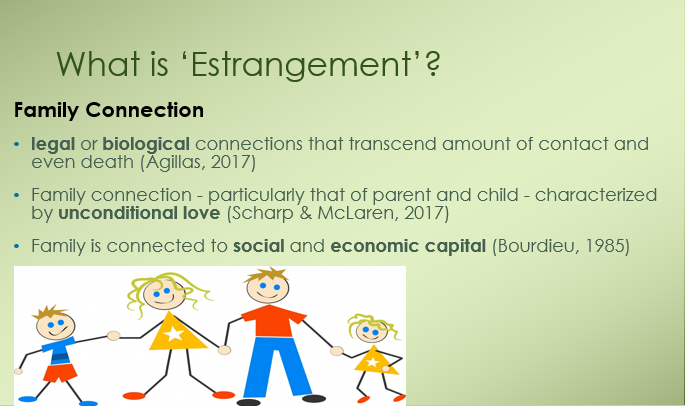 Since January 2018, we have been exploring the experiences of ‘Estranged Students’ in Higher Education and this week we presented some of the preliminary findings of the project at the BERA conference (11th-13th Sept. 2018). We follow this with our conference at the University of Strathclyde (20th Sept. 2018) titled ‘Accessing Higher Education: The Experiences of ‘Estranged Students’ Beyond Entry Point’.
Since January 2018, we have been exploring the experiences of ‘Estranged Students’ in Higher Education and this week we presented some of the preliminary findings of the project at the BERA conference (11th-13th Sept. 2018). We follow this with our conference at the University of Strathclyde (20th Sept. 2018) titled ‘Accessing Higher Education: The Experiences of ‘Estranged Students’ Beyond Entry Point’.
Estrangement as an area of widening participation is rather under-researched, and our BERA paper certainly raised questions of definition, usefulness and ambiguity of the term, as well as the likely heterogeneity of ‘estranged students’. In conversation with delegates, we probed at University itself as a ‘strange’ place, potentially causing rather than solving, estrangement.
Understandings of the experiences of students who are given statutory recognition for estrangement are rather scarce: can they be understood as a ‘widening participation’ group? Do they self-identify as such? In the Scottish context only 3 universities have so far have taken the StandAlone pledge to support people who are estranged from their family. This means that the majority of Universities have not and, as such there is clearly an urgency in bringing knowledge about the experiences of this cohort of students to the fore, informing widening participation officers, policy makers and practitioners, and instigating sector change.
The term ‘estranged students’ has been used by policy makers and support groups to refer to students whose relationships with their biological/adoptive parents and/or wider family have broken down (OFFA, 2017). Estranged students are a non-traditional group of students in Higher Education (HE) and may lead their study career without the financial and emotional support of their close family. But we ask if there is an emerging, rather awkward individualising tendency to psychologize ‘estrangement’ from family in this context, over-emphasizing the need for therapeutic solutions as ‘working on the self’, rather than structural reform. The rhetoric and practice of the ‘family’ has itself materialized all sorts of inequalities and violences, and understanding its nature as a social ‘buffer’ is rather complicated.
In England, the status of ‘estrangement’ was first introduced in student funding policy in 1997, alongside other financial changes –sitting alongside the marketization of Higher Education and the increased notion of what constituted a ‘student experience’ . The purpose was to enable estranged students to access financial support independently of their family’s income (Smith & Malcolm, 2008). In Scotland, however, the same status was only recognised in 2016, thus creating an almost 20 year gap between the two countries where the enactment of policy and practices aimed at supporting estranged students are concerned. What is a ‘student experience’ in the context of ‘estrangement’?
‘Estranged students’ continue to face numerous and specific hardships not only in accessing HE, but also in completing their studies – as with other studies, we aim to complicate the story of ‘getting into’ University, exploring how interviewees’ sit with and resist ‘estrangement’. No doubt, hardships remain, encompassing not only financial pressure, but also experiences of homelessness, discrimination and mental health problems amongst other issues, during their time at University (Bland, 2015). The scale of these challenges arguably extend beyond understanding of socio-economic struggles, though not enough is known about the intersection, for example, between ‘estrangement’ and other categories of university participation and (e.g. race, class, gender, sexuality).
Moreover, research on estrangement is extremely limited and mostly pertains to the fields of psychology, social work or communication studies. The only data available to date come from studies commissioned by and for Stand Alone, a charity that supports and raises awareness of the challenges faced by this ‘non-standard’ entry group. In 2016, the Stand Alone Pledge was launched to help HE institutions improve the support they provide to estranged students. The pledge has now been signed by 50 institutions UK wide
Challenges identified in research (see Bland, 2017) relate to economic struggles that often impact on practical issues such as accommodation and affordability of basic goods. Research has also point out that stigmatisation and belonging are key issues estranged students face as part of their identity. The research we conducted so far confirms most of these aspects, but it also unveils a different side to estranged students regarding a very strong sense of personal resilience.
Research by Prof Yvette Taylor; Dr Cristina Costa; Sidonie Ecochard and Claire Goodfellow










